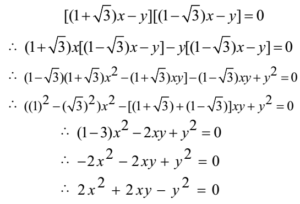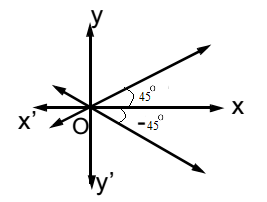Science > Mathematics > Pair of Straight Lines > Combined Equation of Lines When Their Slopes are Given
In this article, we shall study to find a combined or joint equation of pair of lines when the slopes of lines are given.
Algorithm:
- Locate slopes m1 and m2 of the two lines.
- Use y = mx form to find equations of the two lines.
- Write equations of lines in the form u = 0 and v = 0. Find u.v = 0.
- Simplify the L.H.S. of the joint equation.
Example 01:
- Find the joint equation of a pair of lines through the origin having slopes 1 and 3.
- Solution:
Let l1 and l2 be the two lines. Slope of l1 is 1 and that of l2 is 3
Therefore the equation of line (l1) passing through origin and having slope 1 is
y = 1 (x)
∴ x – y = 0 ……. (1)
Similarly the equation of line (l2) passing through origin and having slope 3 is
y = 3 (x)
∴ 3 x – y = 0 …. (2)
From (1) and (2) the required combined equation is
(x – y) (3x – y) = 0
∴ x(3x – y) – y(3x – y) = 0
∴ 3x2 – xy – 3xy + y2 = 0
∴ 3x2 – 4xy + y2 = 0
This is the required cobined equation.
Example 02:
- Find the joint equation of a pair of lines through the origin having slopes 4 and -1.
Solution:
Let l1 and l2 be the two lines. Slope of l1 is 4 and that of l2 is – 1
Therefore the equation of line (l1) passing through origin and having slope 4 is
y = 4 (x)
∴ 4x – y = 0 ……. (1)
Similarly the equation of line (l2) passing through origin and having slope -1 is
y = -1 (x)
∴ x + y = 0 …. (2)
From (1) and (2) the required combined equation is
(4x – y) (x + y) = 0
∴ 4x(x + y) – y(x + y) = 0
∴ 4x2 + 4xy – xy + y2 = 0
∴ 4x2 + 3xy + y2 = 0
This is the required cobined equation.
Example 03:
- Find the joint equation of a pair of lines through the origin having slopes 2 and – 1/2.
- Solution:
Let l1 and l2 be the two lines. Slope of l1 is 2 and that of l2 is – 1/2
Therefore the equation of line ( l1) passing through origin and having slope 2 is
y = 2 (x)
∴ 2x – y = 0 ……. (1)
Similarly the equation of line (l2) passing through origin and having slope is
y = -1/2 (x)
∴ 2y = – x
∴ x + 2y = 0 ………. (2)
From (1) and (2) the required combined equation is
(2x – y) (x + 2y) = 0
∴ 2x(x + 2y) – y(x + 2y) = 0
∴ 2x2 + 4xy – xy – 2y2 = 0
∴ 2x2 + 3xy – 2y2 = 0
This is the required cobined equation.
Example 04:
- Find the joint equation of a pair of lines through the origin having slopes 1/3 and -1/2.
Solution:
Let l1 and l2 be the two lines. Slope of l1 is 1/3 and that of l2 is – 1/2
Therefore the equation of line (l1) passing through origin and having slope is
y = 1/3 (x)
∴ 3y = x
∴ x – 3y = 0 ……. (1)
Similarly the equation of line (l2) passing through origin and having slope is
y = (x)
∴ 2y = -x
∴ x + 2y = 0 ……. (2)
From (1) and (2) the required combined equation is
(x – 3y) (x + 2y) = 0
∴ x(x + 2y) – 3y(x + 2y) = 0
∴ x2 + 2xy – 3xy – 6y2 = 0
∴ x2 – xy = 6y2 = 0
This is the required cobined equation.
Example 05:
- Find the joint equation of a pair of lines through the origin having slopes 1 + √3 and 1 – √3.
- Solution:
Let l1 and l2 be the two lines. Slope of l1 is 1 + √3 and that of l2 is 1 – √3
Therefore the equation of line (l1) passing through origin and having slope is
y = (1 + √3)x
∴ (1 + √3)x – y = 0 …. (1)
Similarly, the equation of the line (l2) passing through the origin and having slope is
y = ( 1 – √3)x
∴ ( 1 – √3)x – y = 0 …. (2)
From (1) and (2) the required combined equation is

This is the required combined equation.
